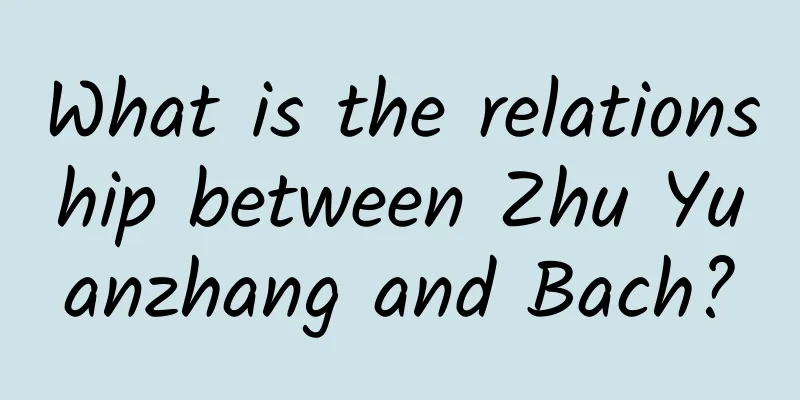What is the relationship between Zhu Yuanzhang and Bach?

|
Leviathan Press: In 1616, the year Shakespeare died, Tang Xianzu, who wrote the masterpiece "The Peony Pavilion", also passed away in Jiangxi; in 1889, the year Nintendo was founded, the 19-year-old Emperor Guangxu finally took power; it is said that Zhang Xueliang, who died in Hawaii in 2001, had heard the songs of Jay Chou, who debuted in 2000, before he died. However, there is no way to verify this. There are always amazing coincidences in history. If they don’t really happen, it’s hard for people to believe them. Children's vows are often seen by adults as just a show of anger or a joke. It is difficult for adults to take seriously a child's tantrum about not eating unless a toy is bought or a campus romance's promise to stay together forever. In 1550, Zhu Zaiyu, the ninth-generation grandson of Zhu Yuanzhang and the 15-year-old "little prince" of the Ming Dynasty, also made a vow: he would not return to the palace until his father came back. What happened to his father? His father, Prince Zheng Zhu Houwan, was described in the History of Ming Dynasty as a "plain and vegetarian" vassal prince. He was ostracized for advising Emperor Jiajing not to practice immortality, take drugs, and study the way to longevity. He was also slandered for having motives of rebellion because he privately studied the calendar and music, and was placed under house arrest in his old house in Fengyang. Zhu's father had done nothing wrong, but he was wronged just because he told the truth and studied. But what could the 15-year-old Zhu do? In desperation, he could only build a simple mud house outside the palace, with no bed or chair, and weeds on the ground, and lived in it in a non-resistance manner, hoping to redress his father's innocence. At first, people thought it was just a child's temper. How long could a 15-year-old boy from a wealthy family live in a leaky house? But what was unexpected was that Master Zhu lived alone in that small mud house for 19 years. It was not until the new emperor came to the throne in 1567 and his father was pardoned that Master Zhu moved back to the palace. * * * It is not uncommon to be convicted for loyal advice, but what was wrong with studying law and making music in ancient times? The earliest known depiction of a Siberian shaman holding a tambourine. © Public Domain In the early days of civilization, music was considered a language for communicating with the gods, and it was considered divine because it could affect people's emotional state. Priests, shamans and other clergy became the ancestors of contemporary DJs. The ancient Greeks believed that music could not only harmonize emotions, but also affect social stability and even cosmic harmony. This power is the ancient Greek word "ethos": for example, Pythagoras believed that the sun, moon and planets all emit their own unique humming sounds due to their orbits, and these sounds are also reflected in the characteristics of life. Plato even asserted that the human soul and the universe are made up of music. The ancient Chinese attributed the origin of music to gods and mythical animals: it is said that Fuxi and Shennong invented the zither, and the music official Linglun imitated the cries of phoenixes and formulated the twelve musical scales (which correspond to the 12 months of the year). The ritual and music system, including the privileges of the royal family in successive dynasties, all emphasized the divinity of music. Imperial power is granted by God. Privately studying music would naturally be seen as an attempt to subvert imperial power. This is the limitation of the times. An Italian engraving from 1496 showing the relationship between the orbits of the planets and musical scales. © gushiciku * * * The wise ancients discovered long ago that the pitch of a musical sound changes according to the speed of the sound-producing object's vibration, that is, the frequency. Therefore, the pitch can be controlled by controlling the vibration frequency (such as the length of the string or the length of the tube). However, how to determine the pitch of each scale (this is the concept of musical temperament) has been a difficult problem that has troubled mankind for thousands of years. The most widely used musical scale in the early West is said to be traceable to Pythagoras' "fifth generation method". Most Eastern musical scales follow the "three-part loss and gain method" invented by Guan Zhong (allegedly) - determining a new tone by 2/3 or 4/3 of the frequency of a certain tone. It is similar to the Pythagorean principle and the method is more than a hundred years earlier than the former. The process of deriving musical scales using the three-part gain and loss method. It is just a coincidence that two civilizations, located at the two ends of the earth, independently developed the same musical rhythm at a similar time. But in fact, this is based on the same discovery - when the frequencies of two pitches are in a simple integer multiple relationship, they sound the most harmonious. Modern physics can explain why this is the case through mechanical wave theory: two waves with integer frequencies can be superimposed into an equally ordered state, while the superposition of waves with non-integer frequencies will become chaotic. However, it is amazing that the ancients could discover this just by hearing. As the saying goes, “The destiny of heaven is unpredictable, but numbers can predict its mechanism.” The numerical core of the calendar and music allowed ancient people in the East and the West to develop their own cosmological views that “number is the origin of all things,” that is, the truth of the universe can be perfectly interpreted through mathematics, such as the ancients’ cognitive structure of “Tai Chi - Liang Yi - Si Xiang - Ba Gua - all things.” Since it is the language of God, the music formed based on mathematics should also be absolutely rational and perfect. However, whether it is the "three-part loss and gain method" or the "fifth degree mutual generation method", they all face the same fatal problem - they cannot perfectly return to the original law after a cycle (in modern terms, it returns to the same main tone of the higher octave), so they cannot continue to change the key repeatedly. In ancient Chinese, it is said that "Huang Zhong cannot be restored." Huangzhong is the first of the twelve musical notes in ancient Chinese law and was regarded as the "sound of the most yang" by the ancients. The ancients talked about the five tones and twelve musical notes. The five tones correspond to the five elements and the twelve musical notes correspond to the twelve months. Months are cyclical, but the twelve musical notes cannot return to Huangzhong. This is a bit embarrassing. Although we don’t know what Zhu Zaiyu was busy with in the small mud house for those 19 years, after all, there was no Weibo or WeChat Moments at that time, but judging from his later achievements, he was most likely following in his father’s footsteps and making music. * * * Some scholars believe that Zhu Zaiyu's experience of his father being falsely accused and convicted was probably due to the fact that the ritual and music system at that time was not harmonious and did not conform to the laws of heaven and earth. Zhu Zaiyu began to try various methods in the hope of perfecting the law, returning the world to the right path, and returning Huang Zhong to its original state. From some historical fragments, we can find that Zhu Yuanzhang, the founding emperor of the Ming Dynasty, was probably also a music lover. He once recruited Taoist priests who knew music to teach music knowledge in the palace in order to improve the overall music level in the palace. Such an atmosphere in the palace would undoubtedly have influenced Zhu Zaiyu. © The Palace Museum In fact, before Zhu Zaiyu, there were many people who noticed this fundamental flaw in the law and tried to improve it. For example, the sixty notes proposed by Jing Fang, a scholar of the Western Han Dynasty, based on the three-part loss and gain method, and even the "three hundred and sixty notes" proposed by Qian Lezhi, a legal and calendar scholar of the Southern Dynasties, directly pushed the ancestors' three-part loss and gain method to the extreme. However, they not only made the law extremely complicated, but also still failed to find the restoration point of Huang Zhong. This can actually be easily explained by modern mathematics, because in the three-part loss and gain method, each tone will have a frequency relationship of 2:3 or 4:3 with other tones, so no matter how many times it is deduced, it will not produce an integer multiple relationship, and Huang Zhong naturally cannot be restored to its original state. A similar situation also occurred in the West. In order to make each note as harmonious as possible with the main note, Ptolemy, the ancient Greek astronomer who proposed the geocentric theory, also derived a law called "pure tuning" (later formally established by the British in the 13th century). However, the harmony under pure tuning is prone to produce wolf tone - an unpleasant sound caused by the resonance of musical instruments. The reason is that the Huangzhong has not been restored. Ptolemy's cosmological system diagram. © owlcation Zhu Zaiyu realized that the easiest way to restore the Huangzhong was to make the various notes in the twelve musical notes in geometric proportion, which means that the frequency multiples of the intervals between the scales would be the 12th root of 2. Zhu Zaiyu was certainly not the first person to think of such a simple truth. However, based on the simple calculation tools of the ancients and their still in the early stages of their understanding of irrational numbers, it is clear that few people actually calculated this number, and no one could accurately calculate it before Zhu Zaiyu. Zhu Zaiyu not only calculated the 12th root of 2, but also deduced this number to 24 decimal places. The tool he used was a double-row abacus with 81 levels... I'll emphasize it again. 81-digit abacus... 12th power... 24 decimal places... In the book "Lüli Rongtong" presented to the court in 1581, Zhu Zaiyu detailed his calculation results and calculation process, and named it "Xinfa Milu". At that time, Zhu was already 45 years old. Mr. Zhu not only made remarkable achievements in music, but also in dance. The picture shows the dance steps he collected. © wiki * * * Although the process of global integration has only occurred in the past two hundred years, in ancient times, music scholars in the East and the West always maintained a close yet distant synchronization. They had once formulated the same set of musical scales and faced the same problem. In the years when Master Zhu proposed the New Law of Secret, similar things were also happening in Europe. In 1584, Vincenzo Galilei, the father of Galileo, an Italian who was included in compulsory education textbooks, demonstrated the "almost equal temperament" of music with a lute and composed "24 Dance Suites", which marked the 24 major and minor keys. Galileo and his son playing the lute. © wiki In the West, Galileo's father was the first scholar to estimate the twelve-tone equal temperament. Unfortunately, the temperament he proposed was not accurate (it was 99 cents, while Zhu Zaiyu's calculation result was an exact 100 cents). It was not until 57 years after Zhu proposed the New Law that the French religious figure and music theorist Marin Mersenne proposed the exact ratio number 1.059463 (yes, only to six decimal places) in his book "Introduction to Harmonious Sounds". This was the first time this number appeared in Western history. However, at the same time, Zhu's theory had already appeared in the notes of Matteo Ricci, an Italian missionary who was preaching in China at the time. Although there is no direct evidence that Zhu Zaiyu's new legal system inspired Western scholars through Matteo Ricci, it is possible that Matteo Ricci knew Mersenne and had correspondence with him during his stay in China. Page from Zhu Zaiyu's "Rhythm of Calendars and Lü". © wiki * * * Mr. Liu Bannong, a pioneer of my country's New Culture Movement, once commented on Zhu Zaiyu's new law and secret law: "Firearms, papermaking, and book printing are the three great inventions of the Chinese. In modern times, they have all made rapid progress and have been greatly improved in the hands of Westerners... Only the twelve equal temperaments invented by Mr. Zhu Zaiyu in the late Ming Dynasty are a great invention that reached the pinnacle of perfection as soon as it was invented." Indeed, later scholars could do nothing more than to continue to extrapolate to the 25th digit (computers can do this, too, quickly and accurately). This is why the famous British scholar Joseph Needham described Zhu Gongzi as a "Chinese Renaissance saint." It is generally believed in the academic community that the first person to truly use the "Twelve-Temperature Equal Temperament" to create musical works was JS Bach. © Curtis Stewart For those who don't listen to classical music much, Bach's name may only be "a relatively familiar classical musician". But in fact, Bach has always been known as the "founder" of Western classical music, and is even more like a god to his peers - "Bach is to music what the founder of a religion is to religion." Schumann said. Even a genius like Beethoven commented that Bach was "not a stream (the word 'bach' in German means 'stream'), but an ocean." Among Bach's many works, The Well-Tempered Clavier is one of the most important. This work divides the 12 semitones within the octave into major and minor keys, and is the first keyboard music collection that uses all keys after the establishment of the modern musical system. But in fact, Bach's work should not be called "The Well-Tempered Clavier". This is just a translation error. The literal translation of its German name is closer to "Collection of Well-Tempered Keyboard Music". However, this cannot deny Bach's pioneering role in promoting the Well-Tempered Clavier. The New York Times once published an article saying: If music is compared to a Bible, then Bach's "The Well-Tempered Clavier" is the "Old Testament". Cover of the manuscript of Bach's Well-Tempered Clavier. © wiki * * * Zhu Gongzi's twelve-tone equal temperament solved the problem of "returning the original" in music with a pure rational spirit, just like a universal seasoning, making the original flavors of various ingredients in the pot compatible with each other, turning it into a harmonious and enduring Buddha Jumps Over the Wall. Modulation and harmony have never been so simple. Bach proved the applicability of the twelve-tone equal temperament through his own practice, and made it the foundation and core of the Western temperament system. The prosperity of music in the past few hundred years is closely related to the popularity of the twelve-tone equal temperament. Secondly, the implementation of the twelve-tone equal temperament has given the global musical instrument industry a consistent and universal standard. Musical instrument manufacturers no longer need to manufacture large keyboards according to the old temperament, and users no longer need to have a large house to store them. This is of great significance to the promotion of music popularization. Zhu Yuanzhang and Bach, two famous figures from the East and the West who had nothing in common, created a wonderful coincidence by being connected by Zhu Zaiyu and his Well-Tempered Clavier. Behind the coincidence is an inevitability that has already begun and is still happening. * * * It took 141 years from the time Zhu Zaiyu proposed the "New Law of Temperament" in 1581 to the publication of Bach's "Well-Tempered Clavier" in 1722. Many things happened during this period. The emperor of the Ming Dynasty gave up his country to the Manchus who entered the country. Copernicus's heliocentric theory shook the status of theology to an unprecedented level. Leibniz invented a mechanical computer that could perform addition, subtraction, multiplication and division in Germany. Cervantes wrote Don Quixote, which made countless people float in the intersection of reality and fantasy. What was even more far-reaching was that the means of production, concepts and culture of other countries brought back by Zheng He during his seven voyages to the West slowly fermented in the East, and Britain defeated the Spanish Invincible Armada to become the new overlord, thus beginning their colonial era. Civilizations separated in different corners of the world were gradually approaching each other, and this was the dawn of globalization. © future-tech What does globalization mean to people living on this planet? possibility. It is based on the possibilities brought by globalization that Sichuan and Shu can be filled with the aroma of chili peppers, and the Eskimos living in the Arctic can use thermoses made in Japan. An Englishman may be driving a German car in a tunnel dug by the French. The engine in the car is from the Netherlands, and the trunk is full of Japanese whiskey. He is wearing an Indonesian sportswear designed by an American, and the buttons come from a factory in Mexico. When you are reading this article on your mobile phone, your phone is using a display screen made in South Korea and a chip made in Taiwan. The Americans gave the design drawings to Singaporeans, who then assembled the entire phone and shipped it to their country. American economist Jagdish Bhagwati once used the Princess Diana incident to explain what globalization is. And such things happen every day. Globalization has not only brought about convergence, but also the wonderful reactions between cultures that have never collided. Even if peppers had not been introduced to China, it would have been difficult for other countries to develop mapo tofu, spicy chicken, twice-cooked pork, and cold beef... Even among the many cultural factors coming from all over the world, the possibilities created by globalization can only be remembered by people if they are as harmonious, balanced and beautiful as music. Text/Mi Rou Proofreading/Sesame filling teeth gap This article is based on the Creative Commons License (BY-NC) and is published by Mirou on Leviathan The article only reflects the author's views and does not necessarily represent the position of Leviathan |
>>: “The Domineering President” Contracts the Forest: What is the weapon of the biggest orange cat?
Recommend
Apple iPhone 11 is going to be renamed, which may indicate that the mobile phone market is declining
There have been rumors for a long time that the n...
PPTV smart TV still faces internal and external troubles, following the good example of Xiaomi and LeTV
At the PPTV Internet TV launch conference just pa...
The Summer Palace (Hao Lei) Baidu cloud download, The Summer Palace Hao Lei high definition and uncut!
The film tells the story of the love-hate entangl...
Online Marketing Promotion: How to Spend the Big Money? Fine-tuned operation of large traffic!
0 cost, small budget, replicable, attracting hund...
Didi Kuaidi’s valuation reaches US$15 billion. Is this a capital game or a reflection of value?
Just after Uber announced that it had raised $1 b...
Meituan APP product analysis report: Strengthen guidance on user decision-making!
1. Introduction 1. Background 2. Experience the e...
The art of love that will charm everyone: teach you how to quickly become a charming woman sought after by the opposite sex!
How hard are men to understand? Why doesn't y...
Teladian, which charges 2.98 yuan per kilowatt-hour, has kicked off a general increase in charging fees. Don’t let saving money on electric vehicles become a joke
"Why do you buy a tram?" Faced with thi...
27 dead and 158 injured! If you find a gas leak, don't do this
Gas is our production and life An indispensable e...
Google Chrome finally supports CSS Variables
This article is not about "news", becau...
Last day: Win8.1 please upgrade to Update
When Windows 8.1 Update was released, Microsoft sa...
Li Jiaqi and Li Ziqi: Where should traffic influencers go?
Two mobile phones and two internet celebrities tr...
[Original] Free promotion of APP with zero budget in the early stage, just do these 17 points!
Preface: I have been working for several years. I...
How to mine long-tail keywords for a website? The secret to doubling your website traffic!
People who are now engaged in search marketing ar...









